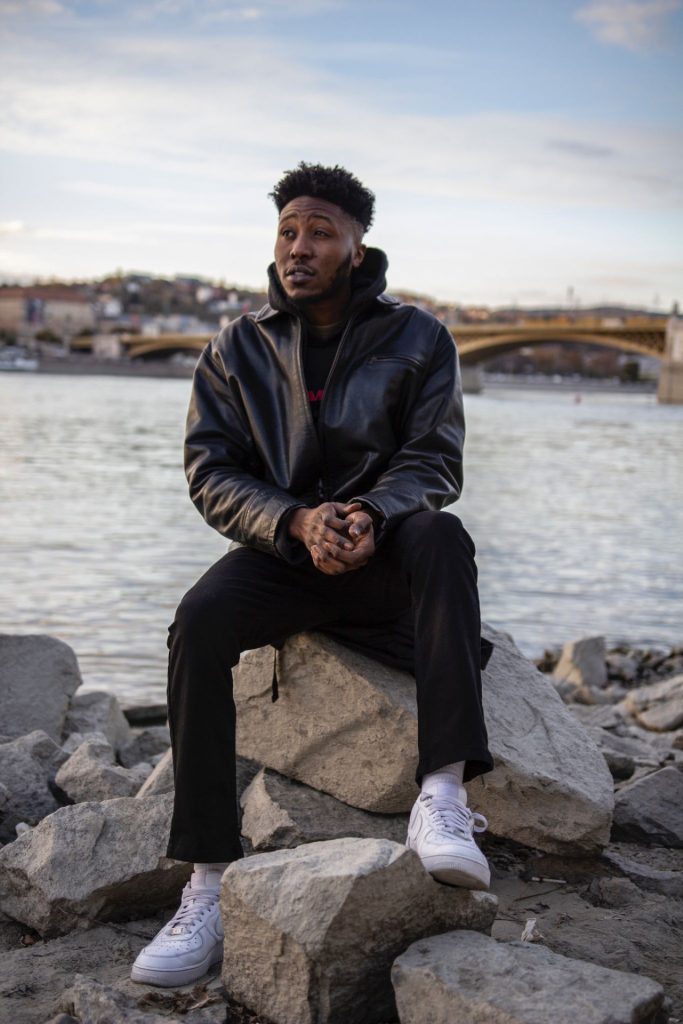
The Quiet Revolution of Delvin: Nigeria’s Introspective Prodigy Finds His Voice in Hungary
How Delvin aka Emmanuel Orpin’s journey from Gboko to global playlists is redefining Afrobeat’s emotional core
In a dimly lit studio outside Budapest, Emmanuel Orpin—known to the world as Delvin—leans over his laptop, tweaking the synth layers on a track from his latest album, Toxic. By day, he cleans hotel rooms in Budapest, a Hungarian city better known for its universities than its music scene. By night, he transforms into a sonic architect, layering Afrobeat rhythms, R&B vulnerability, and existential lyricism into a sound that’s quietly infiltrating playlists from Berlin to Brooklyn.


“The struggle isn’t glamorous,” he admits, flashing a wry grin. “But the friction? That’s where the art comes alive.”
Delvin’s music feels like a late-night conversation with someone who sees straight through you. There are no fireworks, no algorithmic gimmicks—just hypnotic grooves and lyrics that dissect love, loss, and the quiet chaos of existing.
Born in 1994 in Gboko, a small Nigerian town where “the air hums with patience,” Delvin grew up navigating the tension between community and solitude. “Gboko taught me to listen,” he says. “To the silence between words, to the stories people don’t say out loud.” That introspection became his compass, leading him through a winding path: a Public Health degree in Hungary, endless double shifts, and a music career that’s been a slow burn—until now.
Even his stage name is a deliberate act of reinvention. A college friend’s offhand nickname—Delvin—stuck, evolving into a personal vow: Create something that outlives you. It’s a promise he’s been keeping.
Since 2015, Delvin has crafted a sound that exists at the intersection of The Weeknd’s brooding allure and Wizkid’s effortless cool, all while carving a lane that’s unmistakably his own. His sophomore project, Toxic, is his most potent work yet—a 12-track odyssey produced by TNIA Beats and meticulously mixed and mastered by Toby $pades.
The album simmers with the heat of a thousand unspoken truths. Standout tracks like “Rumor” (featuring Toby $pades) blend Afrobeat’s pulse with minimalist electronica, while Delvin’s velvet-on-gravel vocals dissect modern love’s minefields. “It’s not just about heartbreak,” he explains. “It’s about the toxicity we carry in ourselves. The parts we’re afraid to heal.”
What’s striking is Delvin’s refusal to chase clout. In an era where artists scream for virality, he opts for magnetic restraint. His 2019 debut EP, Nostalgia, carried that same quiet confidence, earning him underground acclaim across Hungary and a devoted fan base in Europe’s Afrobeat circuit. But with Toxic, there’s a new urgency. His music strikes a delicate balance—club-ready rhythms infused with raw emotional depth—a duality that’s catching ears in the U.S., U.K., and and back home in Nigeria..
Beyond his music, Delvin himself is a study in contrasts. A Nigerian artist building a base in Eastern Europe. A public health grad scrubbing hotel floors to fund studio time. A poet who name-checks Sartre in one breath and Nigerian highlife legends in the next. “I’m a mosaic,” he shrugs. “Broken pieces make the best art.”
Yet for all his introspection, Delvin’s ambitions are decidedly global. His Instagram (@topmantothworld_) offers glimpses into his creative world—studio snippets, candid reflections, and the occasional throwback to Gboko’s red-dust roads. Meanwhile, Toxic continues to climb the streaming charts, proving that music rooted in authenticity doesn’t need to be loud to be felt.
And when asked about the future, Delvin’s answer is as understated as ever—but charged with intent.
“I’m not here to be loud. I’m here to be felt.”
In a world drowning in noise, that might just be the revolution we’ve been waiting for.
Stream Delvin’s album Toxic on Spotify and follow his journey on Instagram.